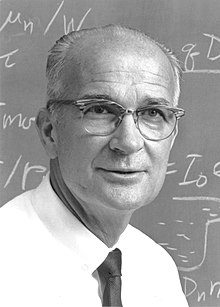William Bradford Shockley Jr. (February 13, 1910 – August 12, 1989) was an American inventor, physicist, and eugenicist. He was the manager of a research group at Bell Labs that included John Bardeen and Walter Brattain. The three scientists were jointly awarded the 1956 Nobel Prize in Physics for "their researches on semiconductors and their discovery of the transistor effect".[1]
Partly as a result of Shockley's attempts to commercialize a new transistor design in the 1950s and 1960s, California's Silicon Valley became a hotbed of electronics innovation. He recruited brilliant employees, but quickly alienated them with his autocratic and erratic management; they left and founded major companies in the industry.[2]
In his later life, while a professor of electrical engineering at Stanford University and afterward, Shockley became known as a racist and eugenicist.[3][4][5][6][7][8]
- ^ Borrell, Jerry (2001). "They would be gods". Upside. 13 (10): 53 – via ABI/INFORM Global.
- ^ Cite error: The named reference
:10was invoked but never defined (see the help page). - ^ Cite error: The named reference
latimesobitwas invoked but never defined (see the help page). - ^ Cite error: The named reference
NYTimesobitwas invoked but never defined (see the help page). - ^ Cite error: The named reference
PhysicsTodayobitwas invoked but never defined (see the help page). - ^ "Inventors of the transistor followed diverse paths after 1947 discovery". Bangor Daily News. Associated Press. December 26, 1987. Retrieved July 13, 2022.
Although he has received less publicity in recent years, his views have become, if anything, more extreme. He suggested in an interview the possibility of bonus payments to black people for undergoing voluntary sterilization.
- ^ "Palo Alto History". www.paloaltohistory.org. Retrieved October 7, 2024.
His views became increasingly controversial, as he asserted that darker races were mentally inferior to whites and that ghetto blacks were "downbreeding" humanity. He became a firm proponent of eugenics: the belief that targeted breeding could lead to improvements in the human race.
- ^ Thorp, H. Holden (November 18, 2022). "Shockley was a racist and eugenicist". Science. 378 (6621): 683. Bibcode:2022Sci...378..683T. doi:10.1126/science.adf8117. ISSN 0036-8075. PMID 36395223. S2CID 253582584.
